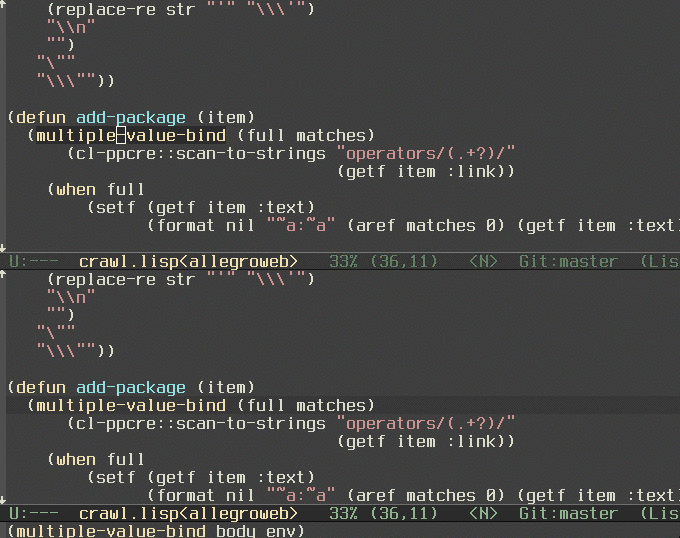While programming, I love to read documentation using helm-dash. I've created quite a few docsets for apps/languages that lacked them in the official repos.
Currently I was using python, common lisp, Picolisp, and Redis, but I felt I was going too often to the franz's Allegro Lisp documentation site. It's nice and loads fast, but it doesn't provide any useful search.
So I created a dash docset for Franz's Allegro Lisp. As usual, it's in my github.
And here's a little gif I recorded to see how does it look.
miércoles, 15 de marzo de 2017
martes, 14 de marzo de 2017
git reflog with dates
reflog is this superhero that only appears when it has to save your ass.
A neat thing about it is that it logs everything you do in a given machine. It works locally, none of the reflog is pushed anywhere, and if you 'git clone', your reflog is empty. But...
For us, that are work are doing very far from BlueGreenDeployments, by doing git pull in a server and reloading (in Common Lisp planet you do hot reloads like a boss), this gives a track of when did pulls happen, and so you can find re-imagine the history of deploys, pulls, deploys, fixes.
It's a suboptimal solution, but given it's for free "don't look a gift horse in the mouth".
As usual in the class of git commands that list info, there are lots of formats and customizations. For me, a simple "git reflog --pretty=oneline --date=short" does the job.
A neat thing about it is that it logs everything you do in a given machine. It works locally, none of the reflog is pushed anywhere, and if you 'git clone', your reflog is empty. But...
For us, that are work are doing very far from BlueGreenDeployments, by doing git pull in a server and reloading (in Common Lisp planet you do hot reloads like a boss), this gives a track of when did pulls happen, and so you can find re-imagine the history of deploys, pulls, deploys, fixes.
It's a suboptimal solution, but given it's for free "don't look a gift horse in the mouth".
As usual in the class of git commands that list info, there are lots of formats and customizations. For me, a simple "git reflog --pretty=oneline --date=short" does the job.
domingo, 12 de marzo de 2017
CTMCP finished!
After a big hiatus of 6 months (space for CLtL The unix programming environment, Object-Oriented Programming in Common LISP
,To mock a mockingbird (part of it) , I continued reading Concepts, Techniques, and Models of Computer Programming.
And it's so good I'm gonna put it next to SICP, GEB, HOP and PAIP (when I get around finishing it). Here are some highlights:
Next, I'm reading PoEAA (a bit old and enterprisey but it's Fowler). And I have Beautiful Data (O'Reilly) waiting....
,To mock a mockingbird (part of it) , I continued reading Concepts, Techniques, and Models of Computer Programming.
And it's so good I'm gonna put it next to SICP, GEB, HOP and PAIP (when I get around finishing it). Here are some highlights:
- The book covers a huge spectrum of programming techniques, and ponders lots of variants and different ways of achieving different tasks. It focuses a lot in declarative programming, which comes very natural for extending the model to streams, logic, relational and constraint programming.
- The whole book examples are written in Oz/Mozart, which is a multi-paradigm language with a Prolog-ish syntax which seemed quite odd in the beginning but in the end I learned to like.
- The tone of the book is so unopinionated and so 'formal', that I missed Eva Lu Ator, and Alyssa P. Hacker.
- I had a lovely AHA moment when discovering difference lists. Very useful to understand the paradigm shift of Prolog style programming.
- Concurrency is touched quite heavily, and the explanations on why the different models exist, and when to use what were very useful from a practical perspective. I loved how they introduced Active Objects.
- Explanations of 'well known' concepts like recusion, accumulators, mapcar, transducers, closures, and streams are very nice, and made me remember of the times I discovered them for the very first time.
- Overall, the book is very readable. Clear style and vocab makes it readable in bed.
- There's an introduction to Constraint Programming. Which feels like total magic. I guess it deserves reading a whole book on that to know a bit more about it.
Next, I'm reading PoEAA (a bit old and enterprisey but it's Fowler). And I have Beautiful Data (O'Reilly) waiting....
Suscribirse a:
Entradas (Atom)



